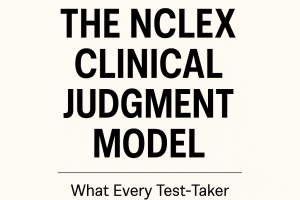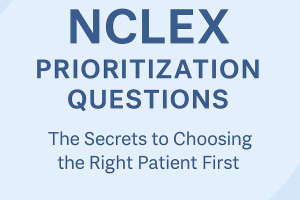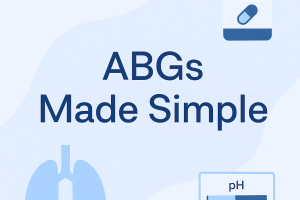Managing Hypertension for Safe Patient Care

Managing hypertension is a critical skill for any nurse, especially in NCLEX exams. Understanding the causes, signs, and nursing interventions for high blood pressure is essential for your success. Here’s a quick guide on the key concepts you need to master:
What is Hypertension?
Hypertension, or high blood pressure, occurs when the force of blood against your artery walls is consistently too high. The two key measurements for blood pressure are:
- Systolic (the top number) – the pressure when your heart beats.
- Diastolic (the bottom number) – the pressure when your heart rests between beats.
Classification of Hypertension
Understanding the stages of hypertension is important for NCLEX questions:
- Normal: Less than 120/80 mmHg
- Elevated: 120-129/<80 mmHg
- Hypertension Stage 1: 130-139/80-89 mmHg
- Hypertension Stage 2: 140+/90+ mmHg
- Hypertensive Crisis: Greater than 180/120 mmHg – requires immediate medical attention.
Nursing Interventions for Hypertension
When caring for patients with hypertension, these interventions are critical:
- Monitoring Blood Pressure Regularly: Regular checks help detect changes and the effectiveness of treatment.
- Administering Antihypertensive Medications: These include diuretics, ACE inhibitors, beta-blockers, and calcium channel blockers. You should be familiar with the common medications and their side effects, such as dizziness, fatigue, or dehydration.
- Patient Education: Teach patients about lifestyle modifications, such as reducing sodium intake, losing weight, exercising, and avoiding smoking and excessive alcohol consumption.
- Promoting Medication Adherence: Emphasize the importance of taking medications as prescribed, even when the patient feels fine.
Key NCLEX Tips:
- Watch for Symptoms: Some symptoms, like headaches or dizziness, might not appear until blood pressure is dangerously high. Always ask the patient about any unusual feelings or symptoms.
- Know When to Act: Hypertensive crises require immediate attention. If you notice systolic BP higher than 180 mmHg or diastolic over 120 mmHg, this is an emergency.
- Monitor Lab Values: Medications for hypertension can affect kidney function, so be sure to monitor BUN, creatinine, and electrolytes regularly.
NCLEX Practice Question
A nurse is caring for a patient with stage 2 hypertension. The patient’s BP is 145/95 mmHg. Which of the following interventions is the nurse’s priority? A. Administer prescribed antihypertensive medication B. Educate the patient on a low-sodium diet C. Take the patient’s blood pressure again in an hour D. Encourage the patient to rest quietly in bed
Answer: A. Administer prescribed antihypertensive medication. This is the priority, as controlling the BP is critical in preventing complications such as stroke or heart attack.






